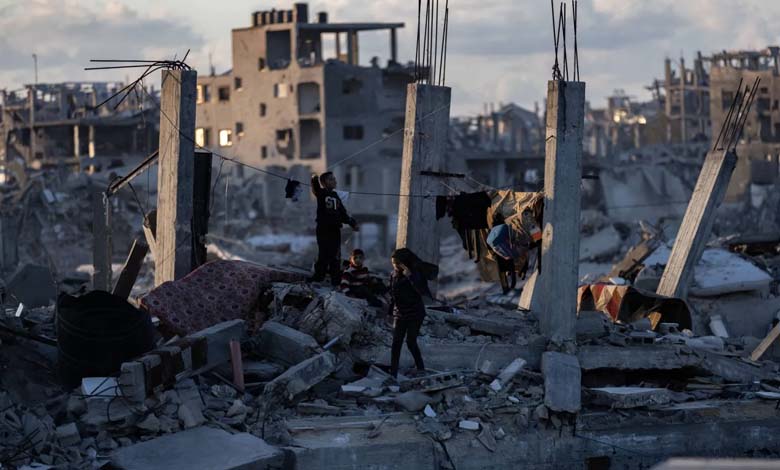Gaza Truce : Just 200 Meters Separate Israel and Hamas

Only 200 meters currently separate Israel and Hamas in their positions regarding a potential ceasefire agreement in the Gaza Strip.
But on the ground, those 200 meters in the vast southern region of Gaza represent a significant expanse that may determine whether or not Rafah remains under Israeli control. The discussion revolves around the depth of Israeli withdrawal from the Philadelphi Corridor, located along the Gaza-Egypt border.
-
Gaza Truce: Israel Loosens Its Red Lines and Steps Back on Morag Corridor
-
Latest from Gaza: Ongoing Israeli Airstrikes and Ceasefire Negotiation Details
According to the Israeli newspaper Yedioth Ahronoth, “the main sticking point remains the withdrawal lines that Israel would commit to, with the gap now narrowed to just a few hundred meters.”
The paper reports that “Israel is reportedly willing to withdraw 1000 to 1200 meters from the corridor, while Hamas is demanding a withdrawal of only 800 meters.”
-
Latest Gaza News: Death Creeps Westward, Israel Issues Warning to Residents of 18 Areas
-
Palestinian Political Analyst: The Occupation is Deliberately Strangling Gaza… and the International Community Fails to Act
Israeli Channel 12 confirms: “Israel is demanding a buffer zone of at least 1200 meters, while Hamas insists on no more than 800 meters.” However, it adds that “sources familiar with the talks say this is a complex dispute, but one that can be resolved.”
According to the channel, both sides are currently awaiting Hamas‘s formal response to the latest ceasefire and hostage deal proposal, which was expected on Tuesday night. Israel, Qatar, Egypt, and the United States are closely watching for Hamas‘s answer.
-
Gaza Latest: Evacuation Orders in the North and Humanitarian Ship Intercepted at Sea
-
Gaza Foundation: Potential U.S. Funding Could Entangle Washington in Aid Chaos
Another point of contention is the number of Palestinian prisoners to be released under the agreement. Israel’s proposal includes the release of 125 prisoners serving life sentences, and over 1100 detainees imprisoned after October 7.
Yedioth Ahronoth notes that Hamas is also expected to push for the release of additional long-term prisoners, estimating the gap between the two sides at around 100 to 150 detainees.
Israeli officials view this issue as solvable, and see the arrival of U.S. President Biden’s envoy to the Middle East, Steve Wietkoff, as a key sign of progress.
-
The Story of Two Grandchildren May Reopen the Genocide File in Gaza… Will France Take Action?
-
Special Operation: Israel Announces Recovery of Two Hostages’ Bodies from Gaza
If the talks advance, Wietkoff is expected to travel to Doha to help finalize the deal. Israeli Prime Minister Benjamin Netanyahu reportedly held a situational briefing on Tuesday night with his negotiating team in Qatar.
Israeli Channel 12 also reported that a trilateral meeting is set for Thursday in Rome, involving Wietkoff, Israeli Strategic Affairs Minister Ron Dermer, and a senior Qatari official.
This Rome meeting is to take place while indirect talks between Hamas and the Israeli delegation continue in Doha. Wietkoff has made it clear that he will only join the negotiations if an agreement is near.
-
When the Besieged Rise Up… Gaza Shouts at Hamas
-
Palestinian Political Analyst: The Occupation Is Deliberately Starving Gaza’s Children to Break the People’s Resilience
Sources familiar with the matter say the Rome meeting is a sign that a deal may be just “days away.”
However, the Israeli news outlet Walla! quoted an Israeli diplomatic source Wednesday morning warning against premature optimism over an imminent breakthrough in the hostage-ceasefire talks with Hamas.
According to the source, the “cautious optimism” stems more from the mediators’ mood than from concrete developments, as Hamas‘s official reply has not yet been passed to the Israeli team.
-
Hunger Precedes Aid: Food Warehouse Stormed in Gaza Amid Humanitarian Collapse
-
After the Chaos of the First Distribution… Will the New Aid Mechanism in Gaza Hold?
It appears the mediators in Doha have already received Hamas’s position but are deliberately delaying its delivery to Israel, in an attempt to refine the language and avoid another deadlock.
“The response Israel receives may well be something like ‘yes, but’,” the Israeli source said, adding that “mediators have spoken with Hamas in recent hours to try to make the response more precise—and perhaps even improve its wording—to form a real basis for progress.”












